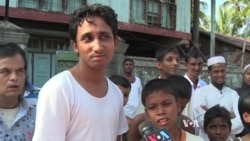ໃນເດືອນນີ້ ມຽນມາ ໄດ້ເລີ້ມດຳເນີນຂັ້ນຕອນ ທີ່ອາດຈະໃຫ້ສັນ
ຊາດແກ່ປະຊາຊົນ ທີ່ເປັນເວລາຫລາຍປີຜ່ານມາ ຖືກຈັດວ່າບໍ່
ມີປະເທດ. ແຕ່ແຜນດັ່ງກ່າວກ່ອນອື່ນໝົດແມ່ນ ພົວພັນກັບການ
ບັງຄັບໃຫ້ຊາວ Rohingya ຕ້ອງໄດ້ປະຖິ້ມຊື່ ທີ່ເຂົາເຈົ້າໄດ້ໃຊ້
ມາເປັນເວລາດົນນານແລ້ວ ແລະໃຫ້ເອີ້ນຕົນເອງວ່າຊາວ
Bengali ແທນ ຊຶ່ງໝາຍເຖິງຜູ້ຄົນທີ່ ມາຈາກບັງກລາແດັສ. ນັກ
ຂ່າວວີໂອເອ Colin Lovett ໄດ້ຢ້ຽມຢາມປະຊາຄົມ Rohingya ຢູ່ໃນລັດ Rakhine ແລະ
ໄດ້ໂອ້ລົມກັບບັນດາຊາວບ້ານ ກ່ຽວກັບສະຖານະ ການຢູ່ທີ່ນັ້ນຊຶ່ງ ກິ່ງສະຫວັນ ຈະນຳເລື້ອງນີ້ ມາສະເໜີທ່ານ ໃນອັນດັບຕໍ່ໄປ.
ຢູ່ລັດ Rakhine ຊາວມຸສລິມທີ່ເປັນຊົນກຸ່ມນ້ອຍທີ່ຮູ້ກັນວ່າ Rohingya ໄດ້ມີຄວາມ
ກະວົນກະວາຍຫລາຍຂື້ນ ນັບຕັ້ງແຕ່ຄວາມວຸ້ນວາຍຊົນເຜົ່າ ໄດ້ທັບມ້າງປະຊາຄົມເມື່ອ
ສາມປີກ່ອນ.
ທ້າວ Pop Ali ຊາວ Rohingya ໃນລັດ Rakhine ກ່າວວ່າ “ພວກເຮົາຕ້ອງການວຽກ
ເຮັດ. ພວກເຮົາຕ້ອງການ ການສຶກສາ. ພວກເຮົາບໍ່ມີເງິນ.”
Colin Lovett ນັກຂ່າວວີໂອເອກ່າວວ່າ “ນີ້ແມ່ນ Aung Minglar ຄຸ້ມມຸສລິມແຫ່ງ
ດຽວໃນເມືອງ Sittwe ແລະເປັນບ່ອນທີ່ໄດ້ເກີດຄວາມຮຸນແຮງໃນ ປີ 2012. ຊາວ
ເມືອງສ່ວນຫລາຍຢູ່ນີ້ ຮ້ອງເຂົາເຈົ້າເອງວ່າ Rohingya ແລະກ່າວວ່າ ການຂົ່ມຂູ່ທີ່ຈະກໍ່ຄວາມຮຸນແຮງ ທີ່ມີຢູ່ຕະຫລອດມາ ພ້ອມທັງການຈຳແນກກີດກັນ ໃນຮູບ
ຂອງການປະຕິເສດບໍ່ໃຫ້ສັນຊາດ ແມ່ນເປັນຮາກເຫງົ້າຂອງສາເຫດບັນຫາ
ທັງຫລາຍ.”
ທ້າວ Shwe La ຊຶ່ງເປັນຊາວ Rohingya ອີກຄົນນຶ່ງ ໃນເມືອງSittwe ກ່າວວ່າ ເຖິງແມ່ນ
ວ່າຄວາມຮຸນແຮງຢ່າງເປີດເຜີຍໄດ້ສິ້ນສຸດລົງແລ້ວກໍຕາມ ແຕ່ສະຖານະການຍັງເປັນທີ່ບໍ່
ໄວ້ວາງໃຈ ເພາະວ່າ ຊາວ Rohingya ບໍ່ສາມາດຫລົບໜີໄດ້ ຍ້ອນວ່າຍັງມີຄວາມຢ້ານກົວ
ບໍ່ມີຄວາມປອດໄພແກ່ເຂົາເຈົ້າ.
ທ້າວ Shwe La ກ່າວວ່າ “ຫລັງຈາກສາມປີຕໍ່ມາ ເຖິງແມ່ນວ່າບໍ່ມີການໂຈມຕີທີ່ຮຸນແຮງເກີດຂຶ້ນກໍຕາມ ແຕ່ສະຖານະການທາງດ້ານສັງຄົມ ອະນາໄມ ແລະເສດຖະ
ກິດ ຍັງບໍ່ດີຂື້ນ ເລີຍ ເພາະວ່າ ພວກເຮົາບໍ່ໄດ້ຮັບອະນຸຍາດ ໃຫ້ອອກຈາກເຂດ
ຂອງພວກເຮົາໄດ້ຢ່າງເສລີ.”
ສາສະໜາອິສລາມ ຍັງໄດ້ກາຍມາເປັນບັນຫາທີ່ພ້ອມແລ້ວຈະລະເບີດ ຢູ່ໃນປະຊາຄົມ
ສ່ວນໃຫຍ່ຂອງຊາວພຸດມຽນມາ ໂດຍການຫັນປ່ຽນແນວຄິດຂອງປະຊາຊົນໃຫ້ຕໍ່ຕ້ານ
ກຸ່ມດັ່ງກ່າວ. ທ້າວ Aye Lwin ເປັນນັກເຄື່ອນໄຫວມຸສລິມທີ່ພົວພັນກັບສາສະໜາອື່ນ
ຢູ່ນະຄອນຢ່າງກຸ້ງ ທີ່ບໍ່ແມ່ນຊາວ Rohingya.
ທ້າວ Aye Lwin ກ່າວວ່າ “ອັນທີ່ເກີດຂື້ນຫວ່າງບໍ່ນານມານີ້ ແມ່ນສາສະໜາກຳລັງ
ຖືກນຳໃຊ້ເປັນເຄຶ່ອງມືທາງການເມືອງ ຈາກພວກທີ່ມີຜົນປະໂຫຍດ.”
ບັນດາຜູ້ນຳຊາວພຸດຫົວຮຸນແຮງ ທີ່ຢູ່່ໃນທັງລັດ Rakhine ແລະແຫ່ງອື່ນໆຂອງມຽນມາ
ພາກັນຢ້ານກົວວ່າ ຊາວມຸສລິມ ຈະເຂົ້າມາຄວບຄຸມ.
ຄວາມເປັນຫ່ວງເຫລົ່ານີ້ ແມ່ນໄດ້ສະທ້ອນໃຫ້ເຫັນໂດຍຜູ້ຄົນຢູ່ໃນລັດ Rakhine ຄືດັ່ງ
ນາງ Mya Sein ໃນເມືອງ Sittwe.
ນາງ Mya Sein ກ່າວວ່າ “ພວກເຮົາມີຄວາມຢ້ານກົວອິດທິພົນຊາວ Bengali ຢູ່ໃນ
ເຂດນີ້. ເພາະສະນັ້ນ ພວກເຮົາຈຶ່ງມີຄວາມເປັນຫ່ວງກ່ຽວກັບຊາວ Bengail ທີ່ອົບ
ພະຍົບມາຢູ່ທີ່ນີ້.”
ຫົວໜ້າລັດຖະມົນຕີ ລັດ Rakhine ທ່ານ Maung Maung Ohn ກ່າວວ່າ ສາສະໜາບໍ່ມີ
ສ່ວນພົວພັນໃດໆກັບບັນຫາການໃຫ້ສັນຊາດ ແກ່ຊາວ Rohingya ຜູ້ທີ່ທ່ານ ແລະລັດ
ຖະບານມຽນມາ ຮ້ອງວ່າ ຊາວ Bengali.
ທ່ານ Muang Muang Ohn ກ່າວວ່າ “ຄົນຈຳນວນນຶ່ງຍັງປະຕິເສດ ບໍ່ຮັບເອົາຄຳວ່າ Bengali ແລະເຂົ້າຮ່ວມໃນຂັ້ນຕອນ. ເພາະສະນັ້ນ ຄຳຖາມຈຶ່ງມີຢູ່ວ່າ ເຈົ້າຕ້ອງ
ການສັນ ຊາດ ຫລືເຈົ້າຕ້ອງການເປັນຊົນເຜົ່າ Rohingya?”
ສ່ວນໃຫຍ່ຂອງຊາວ Rohingya ທີ່ ວີໂອເອໄດ້ໂອ້ລົມນຳ ກ່າວວ່າ ເຂົາເຈົ້າຈະບໍ່ເອີ້ນຕົນ
ເອງວ່າ ເປັນຊາວ Bengali ເດັດຂາດ ທີ່ຈະເຮັດໃຫ້ເຂົາເຈົ້າ ບໍ່ມີສິດເພື່ອເຂົ້າຮ່ວມຂັ້ນ
ຕອນໃນການຂໍສັນຊາດໄດ້.
ກຸ່ມ VOX POP Dar Pang ຮ້ອງອອກມາວ່າ
“Rohingya Rohingya”
ໃນຂະນະທີ່ຊາວ Rohingya ແລະ ລັດຖະບານ ຕ່າງກໍບໍ່ລົງລອຍກັນໃນແນວຄິດຂອງຕົນ
ຢູ່ນັ້ນ ສະພາບການບໍ່ໄປບໍ່ມາ ທີ່ແບ່ງແຍກປະຊາຄົມດັ່ງກ່າວນີ້ ຈຶ່ງປະກົດວ່າຍັງຈະດຳເນີນຢູ່ອີກຕໍ່ໄປ.
This month Myanmar resumes a process that could grant citizenship to people who for years have been stateless. But the plan involves first requiring Rohingya to abandon the name they have long used for themselves, and instead call themselves "Bengalis," which typically refers to people from Bangladesh. VOA's Colin Lovett visited Rohingya communities in Rakhine state and talked to residents about their situation.
In Rakhine, the Muslim minority group known as Rohingya has grown increasingly desperate ever since ethnic riots tore apart the community three years ago.
"We need jobs. We need education. We have no money."
"This is Aung Minglar, the only Muslim neighborhood in Sittwe and the site of the 2012 violence. Most of the residents here identify themselves as Rohingya and say the threat of violence, ever present, as well as discrimination in the form of denied citizenship, are the real root causes of the problems."
Resident Shwe La says although the overt violence has stopped, the situation remains dire because Rohingya can't leave because of continuing fears for their safety.
"After three years later, although there is no violent attack, our social, health and economic situation, have not been improved because we are not allowed to get out of our area freely."
Islam has also become a flashpoint issue in majority Buddhist Myanmar, turning public opinion against the group.Aye Lwin is a Muslim interfaith activist in Yangon who is not Rohingya.
"So what has happened lately is that religion is being used as a political tool by those people with vested interests."
Some extremist Buddhist leaders, both inside Rakhine and elsewhere in Myanmar, are stoking fears of a Muslim takeover.
Those concerns are echoed by Rakhine people like Mya Sein in Sittwe.
"We fear Bengali influence in this area. That's why we are concerned about the Bengali migration here."
Rakhine State Chief Minister Maung Maung Ohn says religion has nothing to do with the issue of citizenship for Rohingya, whom he and the Myanmar government call Bengalis.
"Some people are still refusing to accept the term [Bengali] and participate in the process. So the question is, do you want citizenship or do you want Rohingya ethnicity?"
Most Rohingya VOA spoke to said they would never identify themselves as Bengalis, making them ineligible for the citizenship process.
"Rohingya, Rohingya"
With Rohingya and the government each entrenched in their view, the impasse that divides this community appears likely to continue.





